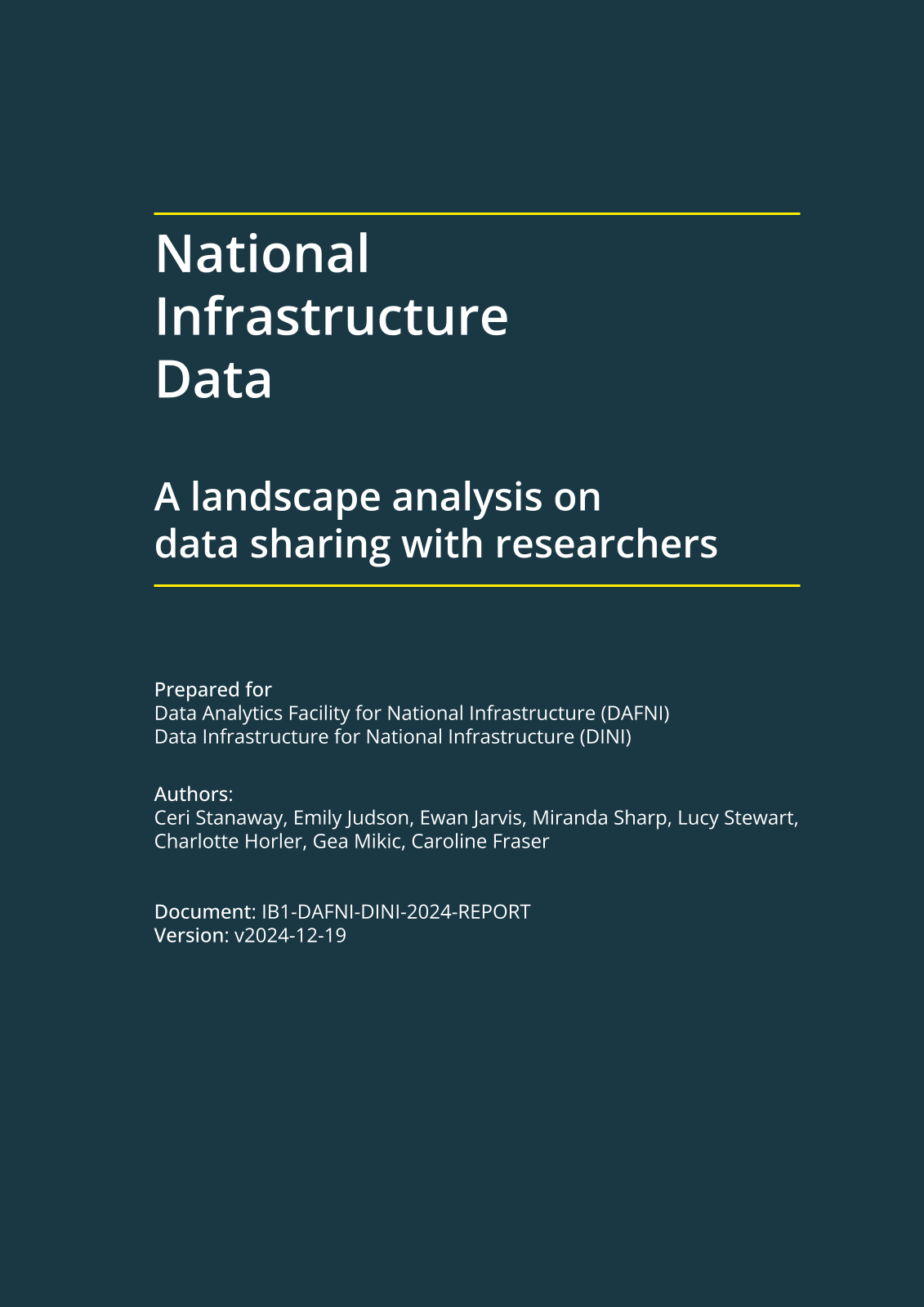
See our landscape analysis on national infrastructure data sharing with researchers here.
Executive summary
Icebreaker One, in collaboration with Arup, supported the DSIT-funded Data Infrastructure for National Infrastructure (DINI) project within the Data Analytics Facility for National Infrastructure (DAFNI) programme. They conducted a pilot study on the requirements and impact of supporting improved sharing of national infrastructure data with publicly funded researchers, focussing on energy, water and transportation sectors.
Key findings
Experience to date of infrastructure data sharing with researchers is diverse: some organisations consider this ‘business as usual’, while others never share data. While Open Data publishing using standardised portals and licenses is on the rise, the sharing of other types of data, subject to access controls or licence restrictions, is dominated by bespoke, individually negotiated agreements. Even where standardised portals exist, different portals may be used across (and sometimes even within) different sectors, causing potential issues when looking to combine datasets from different sectors. Infrastructure data providers demonstrate clear demand for standardised, interoperable, low cost, and scalable legal mechanisms to share data. They also indicate that better knowledge of the research community and researcher user needs could improve data sharing for all parties.
Benefits to sharing infrastructure data with researchers were analysed and mapped into the following categories: social, economic, environmental, and outcomes for data providers. Analysis generated the overarching finding that data provider understanding of benefits is often theoretical at present, with few organisations able to concretely evidence or measure such benefits either quantitatively or qualitatively. Where benefits are measured, this tends to prioritise direct monetary outcomes for data providers. There is a notable evidence gap regarding the translation of system-level benefits to their impacts on different types of infrastructure bodies.
This project also analysed and mapped current barriers to data sharing into legal, security, commercial, cultural, and technical categories. Analysis indicated that barriers varied amongst organisation types; however, of all barrier types, technical barriers presented the least substantial concern among participants. Security barriers to data sharing were identified as an area of growing concern, and in some cases were seen to be in conflict with approaches in academia (for example, cross-border sharing represents scholarly norm, but doing so poses additional security risks), but there is variable understanding of risk. Cultural barriers, including reputational and trust based factors, were identified as strongly influential in decisions and practices governing infrastructure data sharing both with researchers and other audiences. Cultural barriers can be complex to pinpoint as they are often diffuse and influenced by relationships and events taking place across wider sectoral networks. However, the power of such concerns to block or restrict data sharing should not be underestimated.
Recommendations:
- Data providers and those who facilitate data sharing (e.g. regulators, aggregators) must invest in co-designing appropriate and open governance for data sharing to foster data accessibility and interoperability within and across sectors. Good data governance must be based on the principles of transparency, accountability, engagement, and responsiveness in order to address legal, policy, security, and communications needs in addition to technical matters
- Data sharing initiatives between infrastructure data providers and the research community must build on existing initiatives in order to promote interoperability, prepare for many-to-many data sharing, and reduce the burden on data providers and data users.
- National data sharing initiatives must be designed with cohesion (with other initiatives), flexibility, extensibility and capacity-building in mind. This requires the ability to guide less digitally mature organisations through a gradual on-ramp, such as supporting the transition from manual to API data sharing.
- Research and innovation funders should support research that makes clear and advocates for the practical and strategic benefits of sharing national infrastructure data with researchers. This should explicitly account for nuance concerning the sharing of different data types (e.g. business, operational, and geospatial) or sensitivities (e.g. personal, commercial, security) and provide frameworks or guidance on the translation of research outcomes and benefits back to data providing organisations.
- Research funders should invest in documenting research-based best-practice case studies and use cases for commercial organisations to better understand what data researchers are looking for, and in what formats, to enable data providers to prioritise service development.
- The research community should actively engage with commercial data providers to embed researchers within organisations to build a collaborative approach, which will ease the administrative burden on data providers.
